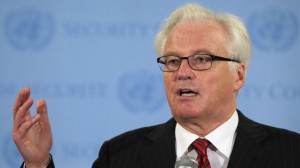 TEHRAN (Tasnim) - Russia asked the UN Security Council to look into the dangers posed by a badly-guarded stockpile of yellowcake uranium in the Libyan Desert.
TEHRAN (Tasnim) - Russia asked the UN Security Council to look into the dangers posed by a badly-guarded stockpile of yellowcake uranium in the Libyan Desert.Recent reports have said that Al-Qaeda is interested in the supply as a potential nuclear weapon component.
I have spoken with UN General Secretary Ban Ki-moon about the issue, and asked him to take it up with the United Nations mission in Libya, Russias UN envoy, Vitaly Churkin, told ITAR-TASS news agency from New York.
I also said we would mention the problem at Security Council consultations, and we have done so.
Churkin also said that the head of United Nations Support Mission in Libya, Tarek Mitri, spoke with Prime Minister Ali Zeidan, who promised to focus on the issue. The Russian diplomat also said that a special inter-ministerial committee was set up in Tripoli to deal with the matter.
The UN envoy also stressed that Libya remains an issue of concern as it acts as a source of proliferation of weapons and materials related to the production of weapons of mass destruction throughout the region.
During the consultation, Churkin said that Russia made two specific proposals. First of all, to send the matter to the expert panel committee of the UN Security Council (UNSC) that monitors the implementation of sanctions against Libya with the possibility to ban arms exports from the country.
Secondly, Russia asked the Security Council relay the organizations concern to the Libyan authorities so that they will treat the issue in a serious way and will try to take practical steps to remedy the situation," said the permanent representative of the Russian Federation.
An estimated 6,400 barrels of yellowcake uranium were discovered near the Muammar Gaddafi stronghold of Sabha towards the end of the uprising that resulted in the rulers death in October 2011, RT reported.
The UNs International Atomic Energy Agency (IAEA) has performed an inventory of the stock which is kept in an ordinary warehouse, next to an estimated 4,000 surface-to-air missiles previously procured from Russia and technically maintains control over it.
Yet a report from a visiting journalist in the UKs Times newspaper last month alleged that the stockpile was in the control of a local weapons dealer, and his men did not even guard the warehouse for fear of suffering radiation poisoning.
"We have no use for the yellow uranium ourselves and are frightened of it," said Bharuddin Midhoun Arifi, a commander of 2000 fighters in Sabha. "My men don't like guarding the site as they believe it will make their skin fall off. So we guard it from a nearby checkpoint. Maybe someone could steal one or two drums if they wanted, but not more."
According to the militia commander, the security vacuum left following the death of Colonel Gaddafi is now attracting Al-Qaeda, which is seeking weapons.
"Qaeda come to visit me, asking to buy weapons, asking for heat-seeking missiles, asking for uranium," Arifi said. "It started this year when the French sent troops to chase them out of Mali. Qaeda came to Sabha asking for medical supplies. They received some. Next they came back asking for weapons" including surface-to-air missiles capable of shooting down a passenger liner.
Despite The Times report, Libyan Foreign Minister Mohamed Abdelaziz in September claimed the stockpile in Sabha has been secured with the help of IAEA inspectors.
"Libya is trying to determine if the concentrated uranium can be used for peaceful nuclear energy purposes or sold to countries which use the product for peaceful purposes," said the minister.
Yet the Centre for Strategic Studies in Tripoli had previously asked the Libyan authorities to use the uranium for "industrial and agricultural development and in the production of clean energy.
Under Muammar Gaddafi, Libya possessed chemical weapons and ballistic missiles while pursuing a nuclear weapons program. But in 2003, Gaddafi announced that Libya would voluntarily eliminate all materials, equipment, and programs - including weapons of mass destruction and long-range ballistic missiles.
By Tasnim News Agency
The Iran Project is not responsible for the content of quoted articles.










